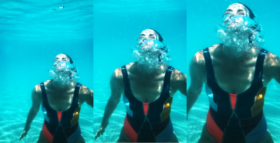
I did not stop moving the first year after my husband died. The kids; the bills; the house; the emails; the cooking; the cleaning; my jobs – I was desperately trying to outrun my grief. It always found me in the car, though, strapped into my seat.
“Ema, are you crying again?” my son would ask, as the tears leaked out from behind my sunglasses.
“Yes,” I told him. “But I’m okay.”
Who had the time to not be okay with so much to do?
I didn’t meet my husband until I was thirty, which gave me plenty of time to make and maintain incredible female friendships. These were the women that rallied around me now; scheduling visits and sending food and calling often. I’ve never been so buoyed by kindness as I was that terrible year. My sons, too. They had seen the worst. And now my village made sure that they saw the best.
The July after he died, one year and one month later, three of my friends flew me to Cabo San Lucas to join them for a long weekend. It would be the first time I had been away from them. I was scared, but they insisted. You need a break, they told me. Get on the plane. And so I left the boys with my mother-in-law and did. Above the clouds, grief found me like it always when I was still. When I disembarked into the glaring sun, my eyes were swollen and red. I could barely see.
Motherhood is my greatest honor, but damn if it doesn’t feel like a prison sometimes. Here in Mexico, I was free.
“Yo Fishman, get in the car!” my friend Lauren called from inside her rental, idling at the curb in her cover-up and flip flops. “Let’s go!”
I moved towards her and was eighteen again: carefree and clueless. It felt good.
The first time you feel good when you’re grieving is terribly disconcerting. It’s like putting on wet jeans.
The sun, the sand and the laughter began to work their magic as day turned into night. The knots in my neck and back unfurled; the furrow between my brows relaxed. But still it felt strange to be lying on a beach chair sipping a mojito, talking about nothing the way that best friends do. Was this what happiness felt like now? Even that felt different.
The next morning had us all up with the sun, sitting on the veranda in our still- damp swimsuits and sipping our coffees. My friend put on a playlist and soon we were bobbing our heads to the soundtrack of our adolescence,; reminiscing and giggling about the absurdity of our former lives’ worries.
The opening bars of “Kyrie Eleison” by Mr. Mister made me gasp; taking me back to riding my bike down the streets of my neighborhood as a kid, singing badly into the wind. It had been so long since I had remembered anything but my husband.
Quietly at first, I began to sing along. My friends took their cues – one grabbed an empty bottle of Diet Coke to use as a microphone, her sunburned scalp peeking through her newly acquired cornrows. Another began to dance in her seat. The other one grabbed her phone to film us, knowing that it was a moment that called for capture.
Moved by my reconnection to a silliness that I feared had been obliterated by my grief, I stood up, clapping my hands over my head. Moving not out of duty, but out of joy.
Kyrie Eleison down the road that I must travel, I sang, thinking of my sons.
Kyrie Eleison through the darkness of the night, I continued, thinking of my husband’s dark beard streaked with gray.
Kyrie Eleison where I’m going will you follow? I asked
Will you follow? my village answered
Kyrie Eleison on a highway in the light!
A song about movement through grief. Towards what, who knew? But I was alive, and that was a gift.
Laughing and crying and dancing, I experienced a catharsis unlike any I had ever known. In my stillness, finally, I had reached up to grab the first rung on the ladder back to me.
Zoe Fishman is the author of six novels, the most recent of which is The Fun Widow’s Book Tour.








